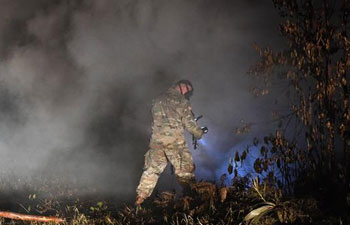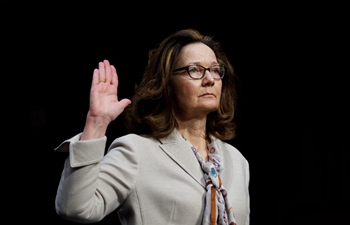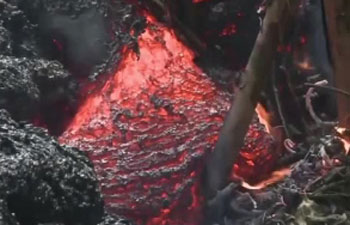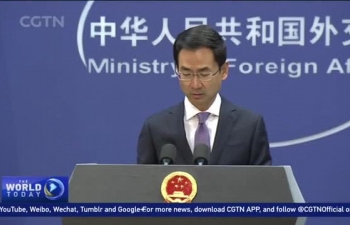by Xinhua writers Zhu Dongyang, Liu Chen
WASHINGTON, May 10 (Xinhua) -- U.S. President Donald Trump tweeted on Thursday that he will meet top leader of the Democratic People's Republic of Korea (DPRK) Kim Jong Un in Singapore on June 12.
"The highly anticipated meeting between Kim Jong Un and myself will take place in Singapore on June 12th," Trump said. "We will both try to make it a very special moment for World Peace!"
U.S. experts said that the chosen site and date, presumably agreed by all parties concerned, were set with serious calculations.
WHY IS SINGAPORE?
Trump on Wednesday ruled out the Demilitarized Zone (DMZ) separating the DPRK and South Korea. He said on April 30 that the DMZ and Singapore could be possible sites for his meeting with Kim. Yet judged by his previous tweets and remarks, the White House host clearly preferred the DMZ.
When asked why Singapore was chosen, White House Principal Deputy Press Secretary Raj Shah told the media later on Thursday that the Southeast Asian nation has a relationship with both the United States and the DPRK.
"They can be ensured -- to ensure both the President's security and Kim Jong Un's security, as well as provide neutrality," he said. "Singaporeans have been gracious up until now and also in the past."
U.S. analysts highlighted Singapore's political neutrality, geological proximity and cultural diversity.
Troy Stangarone, senior director of the Washington-based non-profit Korea Economic Institute on policy research, told Xinhua that "while the DMZ appealed to President Trump for the symbolism that he witnessed during the inter-Korean summit, it also would have been a repeat of what North and South Korea had done."
"If the summit were held on the North Korean side of the DMZ, it also would have sent the wrong optics of the U.S. president traveling to North Korea," he noted.
"Singapore is a neutral location for both sides that has traditionally been seen as a place where the East meets the West," he said. "The United States and North Korea have previously held meetings there, and the infrastructure is well placed to hold a summit meeting. Also, due to diplomatic and business ties it is a place where the North Koreans would feel comfortable meeting."
European nations were once reported favorites. Yet Stangarone argued that "it was always likely a long-shot that the summit would be in Europe due to the distance that Kim Jong Un would have needed to travel."
Brookings Institution Senior Fellow Darrell West also told Xinhua that "Singapore is a place trusted by all the relevant countries."
"It has a tradition of respecting different cultures and working well with a wide range of countries. Those qualities make it an excellent choice to host a major international summit," he said.
In the eyes of Douglas Paal, vice president for studies at the Carnegie Endowment for International Peace, the number of anticipated press personnel reporting the meeting will reach around 7,000.
WHAT MAKES THE MEETING POSSIBLE?
Paal highlighted China's role in making the meeting possible, praising its "huge role" in implementing the UN Security Council's resolutions in a bid to promote the denuclearization on the Korean Peninsula via peaceful dialogues.
In the eyes of West, the common interests of all parties concerned played the fundamental part.
"Trump wants North Korea to denuclearize. North Korea needs economic assistance. The new leader of South Korea hopes to improve family travel to North Korea," he said. "Each country has different interests, but shares a common interest in resolving key elements of this situation."
Shah told media that prior to Trump's acceptance of the DPRK's invitation for a meeting in March, the DPRK had agreed to halt their ballistic missile firing and nuclear testing, and not to publicly oppose the joint U.S.-South Korean military exercises.
"So those were the initial steps that the North Koreans took. We'll hold them to those steps. And then, obviously, there have been subsequent conversations," he said.
However, Korea Economic Institute's Stangarone noted Trump's willingness to do things differently played an important role in making this meeting possible. Besides, Pyongyang has long sought a meeting with the U.S. president.
"But it is hard to imagine any prior U.S. president willing to meet the leader of North Korea with so little still undecided," he said.
Paal at the Carnegie Endowment for International Peace also said that "for the U.S., denuclearization. For North Korea, sanctions relief. Then deadlines. Finally, naming envoys."
MAJOR CHALLENGES AHEAD
Even though the meeting has been set, analysts believe major challenges remain ahead for all the parties to finally achieve denuclearization on the Korean Peninsula.
Shah told media that the U.S. expectation for the meeting is as always -- to ensure a complete, irreversible, and verifiable denuclearization of the Korean Peninsula.
"And that's what he's going to be seeking," he said, referring to Trump.
Stangarone said that the core of the agenda will focus on the elimination of the DPRK's weapons of mass destruction, the normalization of relations, and the removal of sanctions on the DPRK.
"There are a series of challenges they will face," he said. "The United States and North Korea do not have an agreed-upon definition of denuclearization and reaching a clear definition that both sides agree to will be critical to avoiding disputes in the future."
Also, the pace of denuclearization and sanctions relief will also be a challenge, as the DPRK would like a phased process that brings benefits as early as possible, while the United States prefers to see denuclearization completed prior to providing sanctions relief.
The other major issue of contention would be whether the United States agrees to provide economic benefits to the DPRK for denuclearization.
"We've seen that the providing of economic benefits was one of the contentious aspects of the Iran nuclear deal in the United States and I would expect it to be in the North Korean case as well," said Stangarone.
However, Brookings' West told Xinhua that "the biggest challenge will involve trust and verification."
"It is not so hard to reach an agreement, but it is going to involve meaningful verification so that the agreement gets fully implemented," he said. "That likely will be the most contentious part of the negotiations."
HOW IS THE CHANCE FOR SUCCESS?
Stangarone told Xinhua that "there are strong incentives for both sides to see the summit as a success."
"I expect that they will reach an initial agreement," he said. "However, it may be years until we know if the summit is truly successful."
"As Kim Jong Un himself noted at the inter-Korean summit, implementation has been a problem in the past and only once we know how the details of any framework that the United States and North Korea agree to and see how the implementation works, will we truly know if the summit was a success," he explained.
West also believed that there is a chance the summit could be successful if each party is willing to make some concessions. "There already have been several good faith concessions from several countries and that offers hope of a successful resolution," he said, referring to the DPRK's release of three U.S. detainees and repeated announcement to commit to denuclearization, as well as the U.S. positive statements in response.
Paal also said that the Trump-Kim meeting will be deemed successful.
"But the test will be the final outcome, many months away," he said. "We may learn whether this is North Korea squirming off the hook, or there is a real transformation of its goals underway. The first will be negative, the latter really important."
(Xinhua reporter Matthew Rusling also contributed to the story.)













